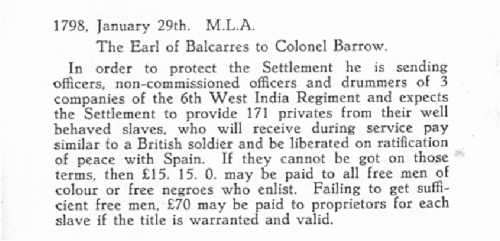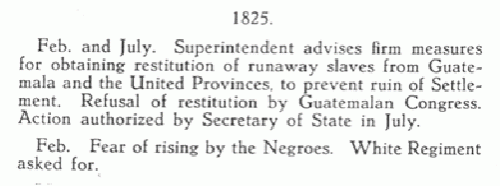Dear Editor,
One of the prevailing opinions on slavery in Belize has been that slaves and masters labored and fought shoulder to shoulder. As Emory King said: “Slavery in Belize, A Family Affair”! This was put together so wonderfully that we can hardly stop singing, “It was the Tenth Day of September… Hip. Hip.”.
We are encouraged, ehem required, to celebrate the Battle of St. George’s Caye. It has been interpreted as a historic moment where the strong bond of slaves and whites, and everyone in between, supposedly came together to give to birth to the nation.
However, throughout the period of enslavement, the settlers, and the ruling elite (which later included Free Coloreds as slave owners) knew they could never say how loyal our African ancestors were to them.
Africans REVOLT in Belize
As early as 1745, when the Spaniards attacked New River, they burnt houses and took slaves with them. Pleading for help from Jamaica, the settlers were afraid that their slaves were not loyal. A settler wrote: “We the Inhabitants of this Place shou’d be Assisted, and being now driven to the Highest distress that can be and reduced to a small quantity of People, not exceeding above Fifty white Men and about a hundred and twenty Negroes, which Number of the latter we cannot tell how many may prove true in the time of Engagement” (Burdon, 1931, p. 72).
Africans revolted against slavery in Belize in 1765, 1768, 1773 and 1821. A settler in 1765 reported “The Negroes belonging to one Mr. Thomas Cooke of Jamaica, rebelled, killed their Master and a Carpenter, robbed the house of every thing that was valuable and fled to the woods… we do not know when it will end” (Shoman, 2000, p. 51).
Three years after, they were faced with similar circumstances, a letter of 1768 reads: “Matters are come to this miserable pass, that Twenty three British Negroes, Armed, had gone off from the New River to the Spaniards, and many more were expected to follow them; so that the Business of every kind was at a Stand” (Shoman, 2000, p. 51).
In May 1773, a captain recorded, “The Negroes before our People came up with them had taken five settlements and murthered six White Men and were join’d by several others the whole about fifty with sixteen Musquets Cutlasses, etc… ” (Shoman, 2000, p. 52).
Closer to the impeding Spanish invasion of 1798, the governor of Jamaica suggested that the settlers should identify 171 slaves who can be paid to help defend the settlement and if that they are unable then they should then pay Free Coloreds or Free Negroes. If none of this is possible, then they were instructed to sell their slaves to the Government to defend the settlement.
At a subsequent meeting, the settlers indicated that it was impossible to provide the 171 slaves. The ongoing talks of payment and potential freedom or indeed the existential threat encouraged free coloureds and blacks to join in the defense, among other factors. The settlers were ordered to oversee their slaves in the defense.
However, the Battle of St. George’s Caye did not change the conditions of enslavement. Slaves would continue to resist. Will and Sharper led a considerable number of slaves to revolt in 1820. A state of emergency was declared in the settlement.
The settlers kept lobbying heavily for additional enforcement from Jamaica to reclaim slaves who had run away and gained freedom in Mexico and Guatemala. They were always fearful that slaves could escape or revolt. This was happening across the Caribbean, turning the hands on the clock for legal emancipation on August 1, 1834 and 1838.
Rolando Cocom
References:
Burdon, John Alder. (1931). Archives of British Honduras, Vol. 1. London: Siifton Praed.
Burdon, John Alder. (1934). Archives of British Honduras, Vol. 2. London: Siifton Praed.
Shoman, Assad. (1994, Revised 2000). Thirteen chapters of a history of Belize. Belize: Angelus Press.
Snippets to include:
Source: Burdon, 1931, Vol. 1
Source: Burdon, 1931, Vol. 1
Source: Burdon, 1934, Vol. 2




